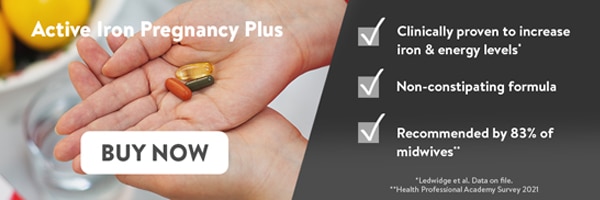At the beginning of pregnancy and even before conception, we have lots of questions regarding our diet and what is best for both mum and baby. A healthy, balanced diet is the best way to get the vitamins and minerals you need. Supplements can also help support the body’s increasing nutritional needs during pregnancy. For anyone considering taking a supplement during pregnancy, they should speak to their healthcare professional about how best to manage.
The Importance of Prenatal Vitamins
During pregnancy, our bodies experience increased physiological changes to support metabolism in the mother and growing foetus, this leads to an increased need for essential minerals [1].
It is recommended that all pregnant women and those planning to conceive should take a supplement containing 400mcg of folic acid. This is to reduce the risk of problems occurring in the baby’s development during the early weeks of pregnancy [2].
A healthy, balanced diet is really important. Some mothers may need further support to cover any nutritional gaps in their diet. A prenatal supplement can help support you in managing this increased demand. For example, the demand for iron increases threefold during pregnancy, which may make it difficult to get enough iron from diet alone [3].
You are currently viewing a placeholder content from Default. To access the actual content, click the button below. Please note that doing so will share data with third-party providers.
When You Should Start Taking Prenatal Vitamins
When is the right time to start a prenatal vitamin? Well for those who are planning to conceive, there is an opportunity to prepare your body and ensure you have a healthy balanced diet. It is recommended that you take folic acid for at least 1 month in advance of conception.
For those who did not have the opportunity to plan their pregnancy, it is important to start taking folic acid as soon as possible, and for a minimum of 12 weeks. Prenatal vitamins are suitable to take in early pregnancy and are designed to complement a healthy balanced diet. Iron is one of the key nutrients monitored by your healthcare professional during pregnancy.
Your healthcare professional will advise you on your iron levels and may recommend you taking an iron supplement from early on in your pregnancy.
The Best Prenatal Vitamins to Take Before you get Pregnant
With such a wide selection of products on offer, choosing the right prenatal vitamin can be a challenge. For those who may have pregnancy complications or any other health concerns, it’s best to consult your healthcare professional before taking a prenatal supplement.
Rather than taking individual supplements, it may be easier to take a product that combines a number of the essential nutrients for pregnancy. If you are considering combination products, it is important to ensure that they contain sufficient amounts of each nutrient.
You are currently viewing a placeholder content from Default. To access the actual content, click the button below. Please note that doing so will share data with third-party providers.
Whatever your choice, it is important to ensure that your prenatal vitamin contains folic acid. It is recommended that you begin taking folic acid supplements before you conceive. This is because folic acid helps reduce the risk of neural tube defects (NTD). A baby’s neural tube will develop into both the brain and the spinal cord, and it develops during the first month of pregnancy. The beneficial effect is obtained with a supplemental intake of 400ug of folic acid daily for at least one month before, and up to three months after conception.
If you are following a restricted diet, a prenatal vitamin that contains iron would be a good choice. Iron is well known to cause side effects, so when choosing your supplement, choosing one that is gentle on the stomach is vital.
The Best Vitamins to take While you are Pregnant
Maintaining a healthy, balanced diet during pregnancy is always the goal but may not always be possible in some cases. Particularly for those who suffer with morning sickness. Nutritional supplements can be of benefit during pregnancy to help support any potential nutritional gaps.
It is recommended that all pregnant women take Folic acid for a minimum of 3 months after they conceive. When choosing a folic acid supplement, ensure it is the best fit for you. Folic acid comes in different forms; L-Methyl Folate is an active, naturally occurring form of folate. A genetic predisposition occurs in up to 67% of the world’s population, limiting their ability to absorb folic acid in its synthesised form [4]. An active form such as L-Methyl Folate could help significantly improve absorption. Supplemental folic acid helps to reduce the risk of neural tube defects (NTD).
A nutrient that is monitored closely during pregnancy is iron. With a blood volume increase of between 40% – 50% [5] your body’s demand for iron increases significantly as your pregnancy progresses. Iron supplements are recommended for women who are unable to meet their iron requirement through diet alone.
Another nutrient that has an important role to play during pregnancy is Omega 3 DHA. Omega-3s are a family of long-chain polyunsaturated fatty acids and are essential nutrients for health and development. They are not synthesized by the human body and therefore must be obtained from diet or supplementation. DHA is important during pregnancy as it helps support foetal eye and brain development. The beneficial effect is obtained with a daily intake of 200mg of DHA in addition to the RDA for omega-3 fatty acids.
The Best Vitamins to Take Post Pregnancy
After giving birth, you will need decent nutrition to support healing and recovery. For mothers who are breast-feeding, there is an increased demand on your nutritional intake. A healthy balanced diet is essential and you should ensure you have sufficient intake of the following nutrients:
- Iron which is important to replenish the iron you lose during childbirth.
- Vitamin B12 helps red blood cell development and energy production.
- DHA, an omega-3 fatty acid for breast-feeding to support babies’ eye and brain development.
- Vitamin D. to support the immune system, brain, and nervous system.
If you are unable to get sufficient intake from diet alone, supplements can help support any nutritional gaps, particularly for those on restricted diets such as vegetarians.
Prenatal Vitamins: Conclusion
In combination with a healthy balanced diet, prenatal vitamins can help support nutritional gaps at all stages of pregnancy. They come in many forms; tablets, liquids, capsules and gummies, so you should be able to find one that suits your needs. When deciding, remember that Folic acid is recommended for at least 1 month pre conception, and 3 months post conception. It can be taken alone or as part of a multivitamin. The beneficial effect of folic acid is obtained with a daily intake of 400ug, so it’s important to check that there is a sufficient level in whichever product you choose. Finally, for those thinking of taking a supplement, consult with your healthcare professional about how best to manage.
[1] Physiology of pregnancy and nutrient metabolism.
King JC
Am J Clin Nutr. 2000 May; 71(5 Suppl):1218S-25S
[2] https://www.nhs.uk/conditions/pregnancy-and-baby/vitamins-minerals-supplements-pregnant/
[3] UN Childrens Fund, UN University, World Health Organisation. Iron Deficiency anameia: assessment, prevention and control. A guide for programme managers 2001.
[4] Folate Nutrigenetics: A Convergence of Dietary Folate Metabolism, Folic Acid Supplementation, and Folate Antagonist Pharmacogenetics. Meshkin et al, Drug Metabolism Letters 2007; 1, 55-60
[5] Guyton & Hall 2005 Textbook of Medical Physiology (11 edition) Philadelphia Saunders pg 103

Marie Louise Hurworth
BSc (Hons) RM & PTTLS
Marie Louise is a Pregnancy Advisor for Active Iron as well as a Prenatal Course Educator & experienced Midwife for the NHS and Author of ‘Pregnancy, Birth & Beyond’.


